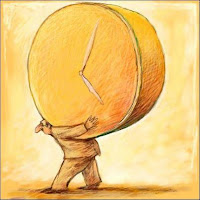The story of Tanzan and Ekido, two Zen monks walking down a rain-soaked country lane, beautifully illustrates the inability or unwillingness of the human mind to leave the past behind. As they approached a village, they bumped into a young woman trying to cross the road but not wanting to get her silk kimono dirty. Without a second thought, Tanzan picked her up and passed her to the other side.
The monks continued walking in silence. Five hours later, being very close to the temple where they would stay, Ekido did not resist anymore. “Why did you lift that girl to pass her across the road?” I ask. "Monks shouldn't do those things."
"I unloaded the girl hours ago," Tazan replied. "Do you still carry his weight on you?"
Imagine what life would be like for someone who lived like Ekido all the time, unable to put past situations behind, accumulating more and more things. Well, that's life for most people on our planet. How heavy is the burden of the past that you carry in your mind!
The past lives in us in the form of memories, but these by themselves do not represent a problem. In fact, it is thanks to memory that we learn from the past and from our mistakes.
Memories, that is, thoughts of the past, are problematic and become a burden only when they completely take over us and become part of who we are. Our personality, conditioned by the past, then becomes a prison. Memories are endowed with a sense of being, and our story becomes the being we think we are. That “little me” is an illusion that does not allow us to see our true identity as a formless and timeless Presence.
However, our history is made up of memories that are not only mental but also emotional: old emotions that are constantly revived. As in the case of the monk who carried the weight of his resentment for five hours, feeding it with his thoughts, most people carry a great deal of unnecessary baggage, both mental and emotional, throughout their lives. Limitations are imposed through their grievances, their regrets, their hostility and their guilt. The emotional thought becomes the essence of who they are, so they hold on to the old emotion because it strengthens their identity.
Due to this tendency to perpetuate old emotions, almost all human beings carry in their energy field an accumulation of emotional pain, which I have called "the body of pain".
However, we have the power not to enlarge our pain-body any further. We can learn to break the habit of accumulating and perpetuating old emotions by flapping our wings and refraining from living in the past, regardless of whether the events occurred the day before or thirty years ago. We can learn not to keep events or situations alive in our minds and to continually bring our attention to the pure, timeless moment of the present, instead of insisting on making mental movies. Thus, our presence becomes our identity, displacing our thoughts and emotions.
There is nothing that has happened in the past that prevents us from being in the present; And if the past cannot prevent us from being in the present, what power can it have?
(A New Earth, Eckhart Tolle)

